Odd Event Reviews... LUGRadio Live 2006
Adam J Purcell logs his travels to LUGRadio Live 2006 on the 22nd and 23rd of July.
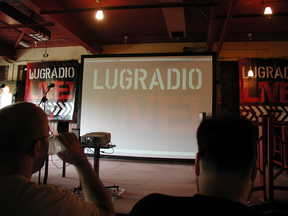
Well, it's that time of year again and Wolverhampton called my name. Yes, it is LUGRadio Live 2006! After the unqualified success of last year's one day event the 'Four Large Gents' (as they like to call themselves - read Freud..!) are back and bigger than ever - it's now a two day Linux and Open Source extravaganza!
Day One
It started with a choice. Should I drive up there on the Friday night or wake up at some ridiculous early hour on the Saturday to be there for 10:00AM. Friday night motorway traffic? No thanks. Saturday it was then. 04:45. That's not early morning, that's still the previous evening, isn't it? Still, I had prepared the way. For the past week I'd been shifting my wake up time earlier and earlier until it reached 05:30 the day before, always a good trick if you are about to travel east and change a few timezones (doesn't work so well going west as you tend to get in late for work...) Not that Wolverhampton is in a different timezone, or east for that matter, but the advice still applies. So with that shock to the system all but eliminated it was time to subject it to something far worse - a room full of sweaty geeks...
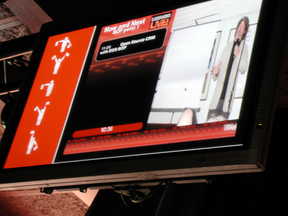
Arrived at the 'Quality Chin' hotel, as they LUGRadio crowd had begun to call it on the forums (for more chin related LUGRadio nonsense see http://www.lugradio.org/chin/, or listen to various of their podcasts!). It was about 09:30 and fortune was on my side - I could book in early as no one had the room the previous night. Then I ran into Steve, who I know from the Sussex LUG, and a few other LUGRadio listeners who appeared familiar from the forums. Goodness knows what the Quality Chin staff thought of us but I can't imagine it is all that usual for their lobby to be full of geeks with their laptops connected to the hotel's wifi hotspot.
Off we trooped to the venue. Last year it was in a bar of the Molineux Stadium, hired especially, but they somewhat underestimated the numbers and mumblings of fire regulations meant there was no way they could use it again. Somewhere bigger was required. Hopefully somewhere cooler, too. Well, one out of two ain't bad chaps! The Student Union of the University of Manchester is quite an impressive place, certainly compared to what I had at my University. It wasn't overly cool, however...
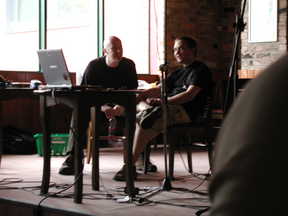
There's the Main Stage, the two Lightning Talks Stages (named Beard and Chin - listen to the podcast...), three BOF points (Birds Of a Feather, informal sessions where people get together to discuss a certain topic) and the exhibition hall. Considerably bigger and better than last year.
The potatoes are gone. Long live the badges. Last year we had our hands stamped with some vile ink as applied by ritual carved potatoe hand trampling. This year we had the rather more overnight stay friendly badge. Not that the ink from last year wouldn't have survived the Sunday morning shower - I think if I look carefully in the right light I can still see it now, over a year later! Or perhaps that's just the pyschological trauma of assault by potatoe! Anyway, being a good boy I had prepaid (and not gone for the concession price - £5 for an entire weekend of LUGRadio madness seems like exceptional value without begging for a £3 concession ticket!) and received a nifty blue badge for my forethought. It even had my name on it. These guys are professionals! I'll have to investigate further why it is blue - there are several apparent colours in circulation. Is there some conspiracy at work..? Or is it just that I prepaid as an attendee rather than being there as an exhibitor, organisor, speaker or paid a fiver on the door? No, surely some mysterious conspiracy...
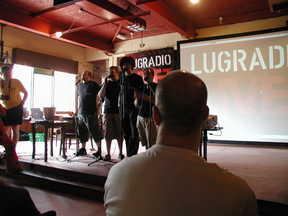
First up, the four LUGRadio presenters themselves open up the preceedings. As last year the four of them are sporting matching tops, each printed with their unique moniker on the back. Matt Revell (angry), Ade Bradshaw (bald), Jono Bacon (beard) and Stuart Langridge (aka Aq) (ging). By the end of the first day Matt was still angry (in truth he seemed nothing of the kind, in fact they all appeared to be enjoying themselves), Ade was still very bald, Aq still had the misfortune of being ginger but Jono... More on that later. Last year they were visibly shocked by how many people had actually turned up. I think it is fair to say it's success took everyone by surprise, the LUGRadio foursome more than all. This year there were no such shocked expressions and clearly even more work had gone into preparing the event. Very impressively organised, I don't know where they find the time to organise their excellent podcast let alone do this as well. Crazy fools! Four amateur podcasters have come from nowhere to put on what is probably the best Linux conference in the country. And for what? £5 tickets - how can that even cover their expenses (incidentally the same price as their one day event last year). No, money is not their motivation - I've no doubt that any left over money (if there can possibly be any) will stay in the kitty for their next event or to cover their podcast hosting costs, etc. They do it for the community, both the community that has grown up around their popular podcast and the wider Linux and Open Source communities. All that work, all that effort. Just maintaining Staggering Stories is millstone enough for me, hats off to these chaps.
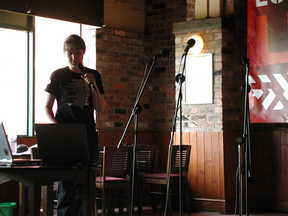
First up, on the Main Stage, was Sarah Ewen from Sony with her hour talk on Linux and the Playstation. Last year Sarah had to pull out at the last minute because of some kind of passport problem but she had promised in a subsequent LUGRadio podcast interview that she will make it this year and she certainly did. In adddition, last year she couldn't have spoken of the PS3 but this year she could. It was still centered mainly on the old PS2 Linux Kit but at the end she did go into some quite technical overviews of the PS3's internals. Impressive sounding kit, though completely different to program for than a PC. Any yes, there will be Linux for the PS3. The PS2 kit almost had me wanting to pick up an old style PS2 (it must be the original case with room for a hard disk drive) and picking up the kit for a play about. Hmm, how much is an old PS2 on ebay..?
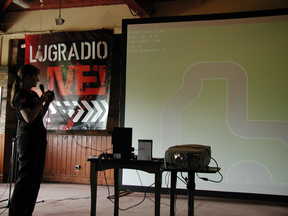
Next up on the Main Stage was Stephen Lamb from Microsoft. Lamb would sound an appropriate name for the slaughtering he might get from a Linux audience. That was definately one not to miss! A lone Microsoft man in a room of a few hundred Linux ethusiasts. I think it was Aq who said something like 'the bravest man in this room' as he introduced him. In actual fact we are a pleasant and well behaved group, honestly, and we didn't say boo to the Lamb. He was a good speaker and didn't often seem to forget who his audience was. 'How to securely integrate Microsoft and Linux systems' was the title of his talk. To be fair he wasn't the usual Microsoft drone. He claimed to have come from a Unix and Linux background and did appear to have a good working knowledge, from what I could tell, of Linux - if a little dated. Towards the end it did feel it had descended into a bit of a marketing thing for Windows Vista's new security model and he even suggested that Linux might be able to learn something from it. I don't think that was really taken too well from the audience but there wasn't any heckling. In the past few years security technologies such as SELinux (originally developed by the NSA) have, I believe, put us at least on par with their new Vista enhancements. That may be more wishful thinking than anything, though. It will be interesting to compare the insecurity issues that hit both Linux and Vista (when it arrives). The main point of his talk was nonplatform specific, however. He had some very good points about security procedures when developing systems, though did seem to lack some understanding of exactly how open source works (hint: open source projects don't just give big bang code drops when a new release is created - you can generally see the code at every stage along it's path to the next release).
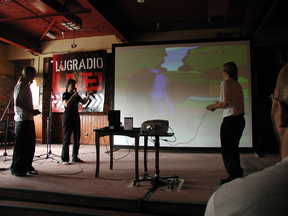
Lunch. This year we get a lunch break! Ah, the luxury of having it spread over two days! A lunch break on each day, in fact. We've never had it so good! My fellow Sussex LUG member and I made our way down the road to a little sandwich shop called the Pork Sandwich (or Pork something, anyway) and it lived up to it's name. I had a pork sandwich. It wasn't the reconstituted ham you get in little precooked packs down Sainsburys. Oh no. This was proper just-sliced-off-a-carcas pork. Good stuff. Then straight back to the Student Union for some milling around and the dread Exhibitors Hall...
Last year I'd wished I had taken more money as O'Reilly had discount books on offer. I bought only one book last time. They do good books. Very good books. They are very Open Source and Linux friendly (see last year's LUGRadio review for more of my thoughts on them). This year I came prepared. £100 spending money for the weekend. Immediately £44 of that went on two books ('From Java to Ruby' and 'Agile Web Development with Rails' - Ruby on Rails being an interesting sounding technology that we've been talking about at work recently) and the first two issues of Make Magazine (that's www.makezine.com!) Being as I bought more than 2 items I also got another free T-shirt (and a different one from last year's freebie). After that wallet busting action I just had to sit down... just in time for the 'Mass Debate'...
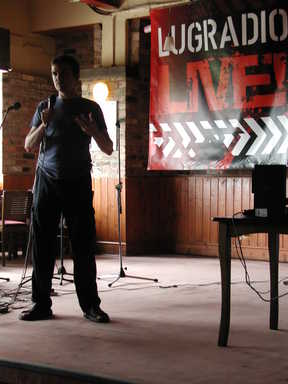
Mass Debate. LUGRadio humour that's stuck from last year. Basically an 'Any Questions' or 'Question Time' style roundtable debate with a group of four speakers taking questions from the audience. Like at talks on the Main Stage this was one hour long but at about half time two of the speakers left an were replaced, both to mix things up a bit and to make sure the speakers could attend their own talks in the Lightning Rooms. Stephen Lamb, Microsoft, and Simon Phipps, Sun, were both there for the entire two hours. Jon Fautley, Red Hat, and Ted Haeger, Novell, were there for the first 30 minutes. Those two stepped down to make room for Danny O'Brien and Bill Thompson, both in technology journalists, I believe. It was a good panel, there tended to be quite a consensus though, so it wasn't quite as exciting as it might have been - the Microsoft chap was fairly quiet on some subjects!
Beard. Hot and sticky. Beard room. A hot and sticky Beard Room and two Lightning Talks were up next for me. Des Burley 'A Lawyer in Open Source' and Matthew Bloch 'Virtualisation'. Both very good, though by the end of Virtualisation I was desperate to get out of the room given just how unpleasantly hot and humid it had become. Both talks were very well attended, more than the room could really take, which didn't help the room temperature at all. I felt that Des Burley's talk in particular could have benefitted from more than the half hour it was allocated, fortunately Simon Phipps would cover some aspects of patents in his later talk, though that was just coincidentally. It is a fascinating, and somewhat worrying, topic that I first really encountered in LUGRadio Live 2005 when Rufus Pollock of the Foundation for a Free Information Infrastructure (FFII) warned us all, see last year's review for more details.
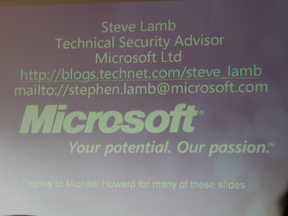
Then, in the same room, it was on to Matthew Bloch from Bytemark Hosting who talked about Virtualisation - running more than one Operating System on the same machine at the same time. This is something I've just recently begun to get interested in and have started to use at the office. There is one Windows program I need to run occasionally and it doesn't work under WINE so I've been resorting to dual booting between Red Hat Enterprise Linux 4 and Windows XP Professional. 90%+ of my work takes place under Linux but it is a right pain to have to reboot every now and then to use this one straggling program. Well, no more. Now I've installed the free (as in beer) VMWare server and can run Windows in a virtual machine hosted under my normal Linux workstation. Yes, I'm running a full Windows from within Linux - the Windows desktop is just another window on my task tray. Fortunately the Open Source movement is also moving at a pace and something like Xen may allow me to replace VMWare with a truely free (as in freedom) VM solution for running Windows. Eventually I may even be able to dump that one Windows program... If that happens it will almost certainly not be the end of my VM usage - already I also have a copy of Ubuntu 6.06 running alongside the Windows VM under Red Hat. Yes, Linux running under Linux. Why, do I hear you ask? No, not 'just because I can'. In this particular instance it is so I can connect to a Virutal Private Network (VPN) in the Ubuntu VM and not lose local network access (for security reasons local network access is disabled when the VPN is operational to stop an intruder using my machine as a route into the VPN. Very sound security but a right pain as I lose my LAN email, intranet, etc. Basically I cannot do any administration to local machines when connected to any remote network.) The virtualised Ubuntu loses access to the LAN but my Red Hat host OS does not. Best of both worlds (and, no, the Ubuntu 'machine' has no special access to my Red Hat host - it just appears as another machine on the LAN). As I said, a fascinating subject and one I'm sure we'll hear a lot more on in the future. The applications are numerous. I also find myself looking seriously at Bytemark to replace my full Plus.net space for Staggering Stories. It will cost a bit more but the extra freedom of having a full (virtual) machine to play with for hosting may well be worth the extra expense. I didn't think of this at the time and wish I'd have had the foresight to talk to Matthew about it in person. Oh, well.
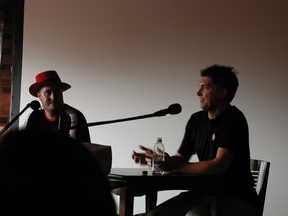
Rush back to the Main Stage for Simon Phipps from Sun's talk 'The Zen of Free'. I was particularly looking forward to this talk after hearing Simon's comments in the Mass Debate and I wasn't dissappointed. Very insightful stuff that really explained free software and I really hope that this is one talk that will make it onto the LUGRadio Live 2006 website in video form. In particular I'd like to reinterate his comments about the unfortunate double meaning of the word 'free' in the English language. When English speaking people are told about software being free they think of money. When you tell them this inanimate object is free they think of money. When you tell them this person or animal is free they think of freedom. Two very different things. Free and Open Source Software (FOSS), as it is sometimes called, is not about costing no money. It is often, perhaps even usually, offered for no monetary exchange but that is not what we think of as free. In fact, getting something for no money doesn't necessary follow that it is free in our terms at all. A good example of such 'free' software I have been messing about with lately is VMWare that I mentioned a moment ago. It is free to download and use, it free in terms we sometimes call 'gratis' (i.e. without paying money). But that's free, isn't it? Only in money terms. I can use it but I can't redistribute it, I can't alter it, I can't sell it, I can't do whatever I want with it - I don't own it. What's that matter? On an individual basis it might not, assuming you don't get problems with vendor lock in, etc. On a larger scale, though, it is an evolutionary dead end. If a problem develops with it then only the authors can fix it, only they have the source code. They may not exist anymore or might perhaps want to charge you big money to upgrade to a fixed version - effectively blackmailing you if you find yourself locked into that product. Want a new feature? Ask them, if you're lucky they may implement it for you, maybe even giving that new feature away free too. You are still at their mercy, though. Truly free software, free as in freedom, is different. This is often referred to as 'libre' software. Here no such restrictions exist. All are free to alter the source code and it becomes an asset for all to work with. Anyone can redistribute it (even for money, assuming they don't mind competing with a zero cost alternative source). Anyone can take chunks of it to build something new. Depending on the licence the authors may need to be credited (but not always). The only thing you can't do is put additional restrictions on what someone else can do with the software. Once it is out there it is out there forever. Anyone can take it and mould it into something new, sparking who knows what innovations that the original authors may never have considered. That's why, ultimately, FOSS will be victorious. The freedom to innovate, to customise and to learn from other's code will destroy closed source software (free as in gratis or otherwise). It's already happening. The avalanche has already begun...
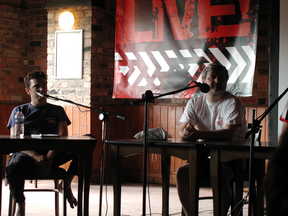
But back to Simon Phipp's wonderful talk. It got a little arcane for the average person on the street so I won't go into detail here but basically toward the end he expressed his thoughts on the true issue for free software - governance. Choosing the right free software licence isn't as much a problem as figuring out how to manage an open source project. Although anyone can take that code and create their own version of a piece of software in practice people tend to submit new features and bug fixes back to the original authors. That way they don't have to maintain their own forked copy, constantly applying fixes and enhancements made by the original authors (and anyone who submits back to them) onto their own altered copy. Merging these changes can quickly become increasingly difficult as the two projects diverge. Unless the forkers have decided to make a clean break and maintain their copy as an entirely separate then it will quickly become so much trouble that their copy will almost certainly die under the pressure. Instead if everyone works on this central version then everyone will benefit from everyone else's work, even though they don't necessarily know or care how the others are using the software. The only issue is how do you maintain control of a project like that? Who has the rights to accept a patch into the code? Who audits the changes? What's to stop overzealous central figures from choking a project by rejecting changes made by people outside of their group of friends? In the recent past we have seen high profile forks of major projects due to governance conflicts, most notably the X windowing system (with the more open fork quickly becoming the new standard) and with 'Mambo' being forked by it's own developers into 'Joomla!' due to project management issues. These forks are costly and difficult on the community. I don't think we have the answers yet but Simon Phipps has certainly highlighted a significant problem.
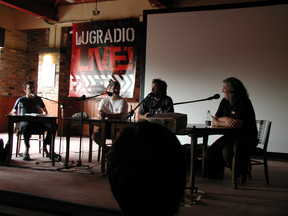
LUGRadio Live and Unleased! It was time for the LUGRadio team to get up on stage and do their thang - in front of a live audience, no less. Last year it was very odd to see these strangers up on stage doing uncanny impersonations of the LUGRadio team that I was so familiar with from their audio podcast. They didn't look at all how I imagined them (despite having seen pictures of them all, somehow the pictures just didn't connect). This year it was different. I knew them now and these four really were Ade, Aq, Jono and Matt (just as they had really been last year!) So, without that bemusement to contend with I could sit back and wonder how these four chaps, used to sitting behind microphones, could have the balls to sit up on stage in front of four to five hundred people and entertain us. And entertain they did. One of the first things they pointed out was that they got a bit of stick for last year's Live and Unleashed episode (probably from people who watched or listened to a recording rather than being there, I suspect) because they didn't once mention Linux. I haven't gone back to check the recordings myself but I have to say I didn't notice but I was thoughly entertained. This year they did an on stage interview with Justin Hornsby (I believe, he wasn't listed on the programme) from MythTV (open source PVR software, like a TiVo or Sky+). I really must look into this given the lack of High Def compatibility on my aging TiVo and wish I'd stopped by their stand to ask more about High Def in the UK with MythTV.
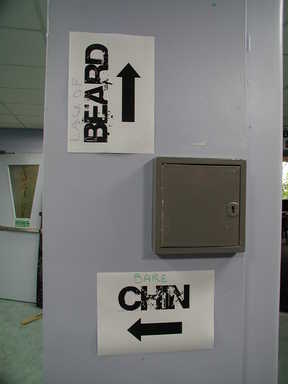
Another memorably part of the Live and Unleashed (which will certainly show up to download as MP3 and, probably, also video) was a feature they called 'Open Source Pass the Parcel'. It was memorable because it failed so badly! The idea was that they'd throw a soft toy Tux into the audience and they would then continue to throw it around until the (deliberately terrible) music stopped. The person left holding Tux would then get to ask the LUGRadio team a question. You can see where this might fail, can't you? Nobody had any idea what to ask! Nothing quite blanks the mind quicker than being put on the spot to ask a funny and interesting question to four guys who run a funny and interesting podcast. Fortunately I wasn't one of the poor saps put on that spot! After a few prize givings for best community members it was on to the part most people were looking forward to - the removal of Jono's commedy beard. It was a beard of legend. It was a beard they named an entire Lightning Talk room after. It had to go. He stipulated that it would only go if we raised at least £400, in a shiny metal bucket, to go to Amnesty International. I think we raised over £500. The biggest donnor, one Ted Haeger from Novell (and good friend of Jono's) won by donating £55 at the last minute to beat the £50 next best. It was with considerable glee, and more than a little nervousness from Jono, that Ted wielded the scissors to separate the bizzare chin growth from Jono's face. Under some pressure from the audience, and with another £50 in the bucket, Aq relented and agreed to shave off his (rather more sensible looking) goatee, too. Neither men seemed very happy with their bare chins as proceedings ended for the day. Just think chaps - it's all for a good cause!
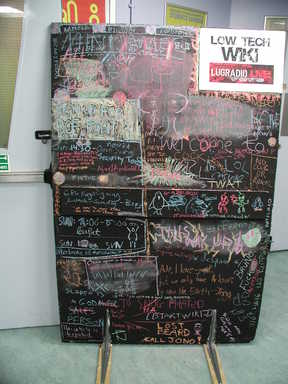
After that it was time for some dinner. Sometime during the afternoon, after horrendous traffic, Nik Butler (another friend from the Sussex LUG, someone I've actually known far, far further back than that actually, must be over a decade - what did I do to deserve that?!) had shown up and a small group of us headed out for dinner. I'm no good at remembering names, so forgive me if I leave yours out, but the group consisted of myself, Steve and Nik (from the Sussex LUG), Jon Fautley (from Red Hat and also the Sussex LUG, though less regularly), the aforementioned Ted Haeger (from Novell and now owning a handful of chin hair), Mirco Mueller (who did a talk and very impressive work on Low Fat and more) and a couple more (sorry chaps, I've already forgotten your names...) Very interesting people and good fun to be around. Besides the amusing stories of language misunderstandings (about half of us were Brits but the others were American and German, I believe), including the classic problem of an American not knowing that 'fanny' means something rather different to a polite middle-aged English woman than to them, it also put me onto a rather good new podcast - Point of Inquiry. One of us even noted that one down in their paper notebook, not me, I might add! It was also interesting just to listen to developers from Red Hat and Novell. We didn't talk shop very much but it is saying something about LUGRadio that they sent developers rather than marketting or sales drones to talk with us. Yes, they were all here expenses paid, this wasn't a personal trip for them, though I'm sure they'd come of their own volition it must be nice to have the company pay! It was also interesting that these chaps should, in theory, be bitter rivals. Novell and Red Hat are the enterprise Linux providers. Red Hat Enterprise Linux and Novell SuSE Linux are the two platforms that the likes of IBM and Oracle support, out of dozens of serious distributions. These two are the big boys. There was some light hearted rivalry as Ted, from Novell, had won a bag of Red Hat swag (such as a red fedora hat, frisbee, t-shirt, etc.) He went through it pointing out little flaws such as a bit of bad stitching on the hat, the thin rim on the frisbee and the XXL large t-shirt that would have swamped him! I wonder if, when he returns to the office, Ted will turn up wearing the red hat and t-shirt?! I wouldn't be surprised! Anyway, after we finished our meals (mine being a chicken and chips - the most edible I could find in the Imperial, an oriental restaurant of some kind) we split up, the two Novell chaps and I heading back to the Quality Chin hotel and the others going directly to the evening party. I wasn't sure if I was up to the party after the 04:30 wake up, all the driving, walking and hilarity of the day. When I got back to my room to drop off my bag and new books I knew I wasn't and collapsed on the bed...
Why would anyone rent a hotel room? Okay, let me clarify that a bit more, why would anyone rent a hotel room for a night (rather than by the hour, as apparently one of the other LUGRadio official hotels turned out to be specialist in - avoid The Fox in Wolverhampton unless you are looking to pay for company...) In my case, at least, I booked the room so I'd have a bed to sleep in for the night. I suspect that is why most people use hotels, the aforementioned Fox excepted. Why, then, would they put on a loud disco in said hotel until gone midnight? I gather they also did the same on Friday night. I didn't end up getting quite as much sleep as I expected, snoozing nicely and then bam, loud music for several hours. Be warned. Other than that the hotel was great but given the primary purpose of the place is somewhere to sleep for the night...
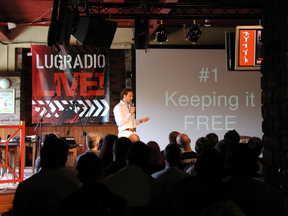
Day Two
A later than intended wake up of about 08:00 saw me starting to write this review, can you tell how far I got? Then at about 09:00 I went down for breakfast and met up with Nik and Steve who were almost finishing up. A couple of croissant and rolls with butter and ham, plus apple juice, fueled me up for another LUGRadio day. I checked out of the hotel, leaving the car, with overnight bag and books, at the hotel and we walked back up to the University. Doors opened at 10:30 but we sneaked in early anyway. After another quick intro by the LUGRadio chaps I joined Steve and Nik in BOF Point 3 (a weird small room with green lighting and no windows or ventilation) for the 'lug.org.uk BOF'. Both Nik and Steve were under the impression they were hosting this one and it was really about finding ways to encourage more people to Linux and Open Source. It wasn't. It was instead about the actual lug.org.uk site and organisation that provides hosting and other technical facilities for any UK Linux User Groups (and, I believe, a few beyond) that wish to make use of their free services. The Sussex Linux Users Group I attend being one. Apparently Steve and Nik's similarly named 'Linux User Groups BOF' had fallen through the cracks, presumably mistaken for this one by the organisers as it had been by us. Nonetheless it was an interesting discussion, if one I could add absolutely nothing to, and I do have a better insight into who and what the lug.org.uk actually is and their immediate problems and thoughts for the future. To be honest, if I'd known it was about this I'd probably gone to the 'Everyone Loves Eric Raymond' and 'Gnome and Fedora' lightning talks instead. I'm in now way affilliated with lug.org.uk, unlike Steve who is on the LUG Masters email list, and therefore it was only of academic interest, though clearly invaluable to the people actually involved. It will be good to see some of the ideas generated in that room come to fruition, such as RSS news feeds from the LUGs being aggregated onto the lug.org.uk front page as news of upcoming and recently past events around the country and perhaps a bit more tranparency for those of us not taking part in the LUG Master mailing list.
By this time it was midday and it was time for the highly anticipated return of Ubuntu poster boy and space tourist, Mark Shuttleworth. Last year I only caught the end of his packed out keynote address, hoping to catch it as a video (surely they'd release this one at least... but no, as of now the 2005 Shuttleworth talk is still not available, over a year later). This year I wouldn't miss it as by all accounts it was quite a highlight last time. This year he was talking about the challenges facing Open Source, in a somewhat similar vein to Simon Phipps the previous day. He went through about 15 points, of which I'm not sure I can remember any - hopefully I can get a video of it this year, hint, hint! One thing was was quite amusing was his impromptu demonstration of a collaborative tool called Gobby. This allows you to be looking and editing the same document as someone else simultaneously, you could even be on opposite sides of the world. The amusing thing was that he didn't have it installed as he hadn't planned to show it. So he plugged a GRPS mobile phone into his laptop and typed in one line, something like 'sudo apt-get install gobby', and there it was! Some people may be afraid of the command line and prefer their graphical installs but how can it be any quicker or easier than that?! No google searching for a web site, no downloading a large windows installer, no trying to find where it saved the file, no double clicking the installer icon, no clicking through series of pointless 'next' buttons. Fantastic and absolutely standard - so much so that you don't even think about the ease and power of it until you see it done on stage at a whim. You won't see Bill Gates doing the equivalent on Windows at one of his talks. A great talk again that along with other speakers this year really highlights how far we've come and the new challenges we face to get to the next level. Also it was good to see he'd cut his hair since last year - multi millionaires shouldn't look like scruffy hackers!!
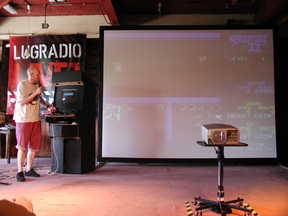
Next up was 'The Hour of Power'! Not, as you migtht expect, a Saturday morning kids cartoon slot but instead a chance for five people to show off their cool projects. Each got 10-12 minutes to pimp their projects on the Main Stage. I may not get the order of these correct but they were: MythTV, the Demo Scene, Linux on a Nintendo DS, MAME Arcade Machine and Lowfat. What are those? I'll give a quick summary:
MythTV is a Linux based (and, naturally, Open Source) Personal Video Recorder (PVR) giving the same features (and more) that you find on a TiVo or Sky+. In other words, stick a TV card into your Linux machine, install this software and suddenly (challenging configuration issues aside) you can record TV programmes onto your Hard Disk and pause and rewind live TV (it carries on recording the live stream if you rewind - a good use of this is to have it record a programme on a non-BBC channel and start watching it 15 minutes late. By the time you have forwarded through the last set of adverts you will have about caught up with the live transmission!) In addition to this basic PVR technology (which also includes the even more useful ability to record based on programme name rather than time/channel and even automatic recording of every episode of a TV programme) it also has a number of features you won't find on a commercial PVR. You can rip DVDs and play them back later without needing to hunt around for the disc, you can view your photo slide shows or home movies, you can play computer games, display news and weather RSS feeds, use a built-in web browser, edit and save off your saved television programmes to DVD and even have it automatically detect and edit out adverts on playback. It's easy to see why some of these features will never show up in a commercial PVR. A good project and one I'm keeping any eye on for when my TiVo needs replacing (which it will once HDTV takes hold in Britain). It was the first time I'd seen MythTV in action and I was impressed, even lacking a TV feed or Internet connection he was still able to demo a lot of functionality.
Next up was (if I recall correctly!) a quick talk on the Demo Scene. I've been aware of this phenomenon since the early to mid 1980s when I used old 8-bit Atari computers (such as the 400 and 800XL). Talented (and presumably time rich!) programmers would produce flashy programmes that really showed off what the hardware is capable of - in those days machines had only a few KBs of RAM, cassette tape storage (or, if you were lucky a 130KB 5¼ inch floppy drive). They did some incredible things back then and they are apparently still at it today. Computers have come a long way in that time but these demoscene people obviously pride themselves in working within tight constraints and still impose strict limits on how large a demo executable can be. We were shown a few such demos and it is amazing what these people can do with a 20KB program! What's more they now all meet up (literally thousands of them) in a massive hall, each with their PCs, and have competitions over a long weekend to see who can come up with the best demos. That must be quiet a strange invasion for the host town!
Linux on a Nintendo DS. It is a similar theme to the demoscene presentation in many ways (and the entire Hour of Power in general), that of the amazing things people can do when constrained within such a restricted environment. The Nintendo DS is a dual screen handheld games machine and successor to the Game Boy Advance. It looks like a good piece of kit from what I've seen - a couple of chaps at work have them and spend their spare time playing against each other in Mario Kart wirelessly. Getting Linux to run on it, though? Yes, the presenter of this talk had managed it, even getting the built-in wifi to work. The lack of RAM (only 4MBs - a massive amount for the mid 1980s but tiny for modern machines and OSes/applications) meant that he can't yet get all the things running he'd like but he's already made an incredible start. Even getting Linux to boot on one of these machines is quite an achievement, the hardware is nothing like a regular x86 PC and there are no technical documents to help with the porting, this is a closed and proprietary system. Sadly the video camera feed he was wanting to use to show the DS working on the big screen wasn't connecting up with the projector (despite Ade's considerable efforts) so his talk was somewhat torpedoed. It was still interesting what he had to say but hearing someone say he had a terminal running in the top screen and a software keyboard in the bottom (the DS uses stylus based touch screens for input along with the directional and fire buttons) isn't quite the same as actually witnessing it! He did pass two hacked DSes around the crowd (very bravely - I assume he got them back at the end!) but they didn't get to me.
The MAME Arcade Machine. It must be about a year and a half or so since the LUGRadio team first spoke of wanting to build an Arcade Machine cabinet. I don't believe they got beyond that thought but this chap had. The Multiple Arcade Machine Emulator (MAME) project is exactly what it sounds like, software that allows you to run literally thousands of old coin-op arcade machine games on your PC, in this case under Linux (although Windows and Mac ports also exist). Anyone can run this software on their PC but for the true experience you need an arcade cabinet and proper arcade style joysticks and buttons. That's what he had built. It was very impressive - big, wooden and looking exactly like a 'real' arcade machine and took months of hard work, mainly woodwork, to construct. The fact he even managed to get it to LUGRadio was impressive, it was no small piece of kit! How would you like an arcade machine that you can choose between five thousand arcade games, such as Gauntlet, Star Wars, Bubble Bobble, Pac-man, Space Invaders, etc? I'd very much like to own one of those!
Finally Mirco Muller with his Lowfat project and other impressive looking bits of software tech. I'm not sure I fully understood the implications or reasons behind much of his talk but he was at pains to point out that he wasn't working on an actual project per se, instead he was working on concepts that might one day take the desktop into new directions. He showed us a movie playing on a flat plane that he could rotate in 720 degrees with no obvious slow down. He showed up his implementation of a Mac OS X style dock, with the icons growing as he moved the mouse pointer toward and over them. He showed us Lowfat, some kind of new file manager that showed files as images of their actual content that he could move around the screen, stack, sort and generally fling around using a built in physics engine. Very impressive to look at but I have to say I've no idea where it is all going - perhaps nowhere, perhaps to a whole new computer interface no unlike the one in Minority Report. Well worth keeping an eye on his bleeding edge work and concepts.
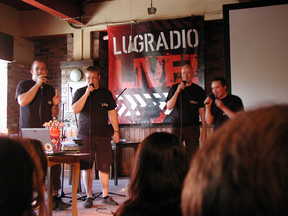
After those breath taking demos I had to take a few minutes break and wander around the exhibition room. The laughter from the next talk - 'Women in Open Source' drew me to the Chin Room but it was packed - I couldn't even get in the door. After a few minutes of not hearing anything the three ladies (Kat Goodwin, Jen Phillips and 'Phated') were saying I gave up and hoped their talk would appear as a movie I could download later. I nipped into the Beard Room to catch the end of Jonathan Riddell's KDE 4 Kubuntu talk, being a long time Gnome user this was interesting but not directly relevant. I have tried KDE a few times over the years but I just plain prefer Gnome, I'm afraid. Still, I'm of the opinion that the competition between KDE and Gnome is a good thing. People sometimes complain about split resources but I think a little healthy competition of ideas is probably of more value longterm.
That led into my final talk slot of LUGRadio Live 2006, at 15:30. I was still in the Beard Room, now to see Elliot Smith's Ruby on Rails Lightning Talk. I knew very little about Ruby and not much more about Rails before this talk. Around work a couple of colleagues of mine have recently started to look into Ruby and specifically Ruby on Rails as a faster and more productive alternative to the dreadful Java Enterprise Edition we are currently working with. Elliot's talk wasn't about the actual code but was instead a general, fairly non-technical, overview of Rails, especially in comparision to PHP. From what he was saying it certainly sounds a lot more productive and maintainable than PHP (and, I suspect, Java). 'Convention over Configuration' sounds like such as obvious thing, so why are we messing around with massive cross referencing XML files in Java? This talk really has me fired up about Ruby - I was curious before, enough to buy those two Ruby books from the O'Reilly stand, but I'm really itching to give it a real go now. Finding the time... finding the time. Once I'm over the initial learning curve Ruby ought to save me considerable time so it will be a good investment, I think.
Then it was back to the Main Stage to see the beardless wonders that are the LUGRadio foursome give away a few more prizes (including Matt nearly blinding half the audience by unexpectedly flinging a couple of dozen sweets on sticks into the crowd!) and saying their thankyous and goodbyes. Already there was talk of LUGRadio Live 2007. They are gluttons for punishment!
And that was about it but for a drained walk back to the hotel and another exhausting 3 hour drive home. It really was a fantastic weekend - a big thankyou to the LUGRadio team and everyone else who helped with it - especially all the speakers who gave their time freely. It was also great to meet all these other LUGRadio listeners and see the LUGRadio team again. I really don't know how they manage it but that is now two years in a row they've pulled off an amazing event that corporate shows can only be envious of. It was bigger than last year. More to see and do (if anything too much happening at once!) I can't imagine they can top themselves again next year - it is almost to the point of being physically impossible - but I've no doubt they can match it! I said it last year and I'll say it again - this is how all Linux events should be!
The photos above are all mine but much better ones can be found at the LUGRadio Live 2006 Flickr Group, including one with me right in the center looking as if I'm about to be attacked by Matt and Jono!






